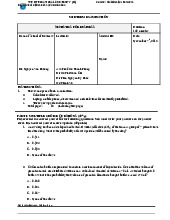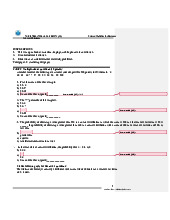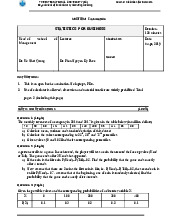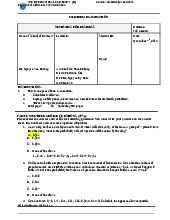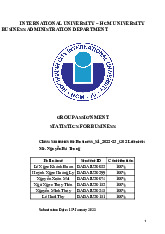














Preview text:
International University IU
STATISTICS FOR BUSINESS [IUBA] CHAPTER 11 M ULTIPLE REGRESSION STRUCTURE OF PAPER
PART I - M ULTIPLE REGRESSION M ODEL
PART II - M EASURES OF PERFORM ANCE OF A REGRESSION M ODEL AND THE ANOVA TABLE
PART III - THE F – TEST OF A M ULTIPLE REGRESSION M ODEL
PART IV - TESTS OF THE SIGNIFICANCE OF INDIVIDUAL REGRESSION PARAM ETERS n io s s re g e R le ltip u : M 1 r 1 te ap h C s | es sin u r B s fo istic tat S
Powered by statisticsforbusinessiuba.blogspot.com 1
International University IU PART I
M ULTIPLE REGRESSION M ODEL
The populat ion r egression m odel of a dependent variable on a set of independent
var iables ,,… , is given by
= + + + ⋯ + +
w here is t he intercept of the regression surface and each , = 1,… , is the slope
of t he regression sur face – som et im es called t he response sur face – w it h respect t o var iable . M odel Assum ptions:
1. For each observat ion , t he er ror t erm is normally distribut ed wit h mean zero and standard
deviat ion and is independent of the error terms associated wit h all ot her observations. That is,
~ (0,) for all = 1,2,…, independent of ot her errors. n
2. In t he cont ext of regression analysis, t he var iables io
are considered fix quantit ies, although s s
in t he cont ext of correlat ional analysis, t hey are random variab les. In any case, re g
ℎ . When we assume that are fixed quantities, we are e R
assum ing t hat w e have realizat ion of varibles and that the only randomness in comes le from t he error t erm . ltip u : M 1 r 1
The Est imat ed Regression Relat ionship te ap
The est im at ed regression relat ionship is h C s |
= + + + ⋯ + es sin u
w here is t he predicted value of , the value lying on t he estimated regression surface. r B
The t erm s , = 0,…,, are the least-squares estimates of the population regression s fo par am et er s . istic tat S
Powered by statisticsforbusinessiuba.blogspot.com 2
International University IU PART II
M EASURES OF PERFORM AM CE OF A REGRESSION M ODEL AND THE ANOVA TABLE
M ean Square Error ( )
St andard Error of Estimate ( )
and are measures of how well the regression fits the data = − = √ ( + )
M ultiple Correlation Coefficient ( )
M ult iple Coefficient of Det erm inat ion ( )
Adjusted M ult iple Coefficient of Det erm inat ion ( )
, , and are measures of how well the regression model fits the data. In other n
w ords, t hey m easure t he per cent age of var iat ion in t he dependent var iable explained io s
by t he indepen dent var iables s re g e
M ult iple Correlat ion Coefficient R le ltip = u : M
M ult iple Coefficient of Determination 1 r 1 te = ap h
= − C s |
Adjusted M ult iple Coefficient of Determination es sin
/ [ − ( + )] − u = − = − ( − ) r B / ( − ) − ( + ) s fo istic tat S
Powered by statisticsforbusinessiuba.blogspot.com 3
International University IU
ANOVA Table for M ultiple Regression M odel Sum of Squares M ean Square F. ratio Source of Variat ion ( ) ( ) () Regression = () = Error − ( + 1) = ( ) − ( + 1) Tot al − 1 ( ) n io s s re g e R le ltip u : M 1 r 1 te ap h C s | es sin u r B s fo istic tat S
Powered by statisticsforbusinessiuba.blogspot.com 4
International University IU PART III
THE F – TEST OF A M ULTIPLE REGRESSION M ODEL
F – test of a mult iple regression model is a st at ist ical hypot hesis test for the existence
of a linear relat ionship bet ween and any of the
F – test of a M ultiple Regression M odel
HYPOTHESIS TESTING PROCESS: STEP 01:
Det er mine t he nu ll and alt ernat io n hypot hesis:
= = = = ⋯ = =
= ( = ,…,) STEP 02:
Const r uct t he ANOVA Table f or t he m ult iple regression m odel n Sum of Squares M ean Square F. ratio io s Source of Variat ion s ( ) ( ) () re g Regression e = R () = le Error ltip − ( + 1) = ( u ) − ( + 1) Tot al : M − 1 1 ( ) r 1 te ap h STEP 03:
Com put e t he t est st at ist ic value ( C
) (based on the ANOVA table) and t he s |
cr it ical value ( ) (based on the level of significance) es sin The t est st at ist ic value: u r B s fo
= − = istic tat S
Powered by statisticsforbusinessiuba.blogspot.com 5
International University IU
At t he level of significance, t he cr it ical value:
= ,,() STEP 04: CONCLUSION
+ Sit uat ion 01: We cannot reject t he null hypo t hesis since <
For t he inst ance t hat t he null hypo t hesis is t r ue, no linear r elat ionship
exist s bet w een t he dependent var iable and any of t he independent
var iables in the proposed regression model.
+ Sit uat ion 02: We can reject t he null hypot hesis since >
For t he inst ance t hat w e can reject t he null hypot hesis, t her e is
st at ist ical evidence t o conclude t hat a regr ession r elat ion ship exist s
bet w een t he dependent var iable and at least one of the independent
var iables proposed in the regression model. n io s s re g e R le ltip u : M 1 r 1 te ap h C s | es sin u r B s fo istic tat S
Powered by statisticsforbusinessiuba.blogspot.com 6
International University IU PART IV
TESTS OF THE SIGNIFICANCE OF INDIVIDUAL REGRESSION PARAM ETERS
A test for t he significance of an individual parameters is important because it tells us
not only whether there is evidence that variable ( = 1, …, ) has a linear
relationship w it h Y but also whet her there is st at istical evidence t hat variable has
explanat ory power wit h respect to the dependent variable .
Tests of the Significance of Individual Regression Paramet ers
HYPOTHESIS TESTING PROCESS: STEP 01:
Det er mine t he nu ll and alt ernat ive hypo t heses:
(Not e: They a re t w o t ailed-test ing) (1) : = 0 : ≠ 0 n (2) io : = 0 s s : ≠ 0 re g e R … … le ltip (k) u : = 0 : ≠ 0 : M 1 r 1 te ap h C s | es sin u r B s fo istic tat S
Powered by statisticsforbusinessiuba.blogspot.com 7
International University IU STEP 02:
Com put e t he t est st at ist ic value ( / ) and the critical values ( / )
based on t he level of signif icance
+ Sit uation 01: If − ( + 1) < 30, w e use −
For t est ( = 1, …, ), t he test st atistic value: − = ( )
At t he level of significance ( ) , the critical values: ± = ± ,()
+ Sit uation 02: If − ( + 1) ≥ 30, w e use −
For t est ( = 1, …, ), t he test st atistic value: − n = io ( s ) s re g
At t he level of significance ( ) , the critical values: e R le ± = ± ltip u : M 1 r 1 te ap h C s | es sin u r B s fo istic tat S
Powered by statisticsforbusinessiuba.blogspot.com 8
International University IU STEP 03: CONCLUSION
At t he level of significance, for each t est ,
+ Sit uat ion 01: We cannot reject since ∈ [−,] or ∈ [−,]
For t he inst ance t hat t he null hypot hesis is t r ue t hat t he slope
par am et er of is non – significant and no linear relationship exists
bet w een t he dependent var iable and the independent variable
+ Sit uat ion 02: We can reject since ∉ [−, ] or ∉ [−,]
For t he inst ance t hat w e can r eject t he nu ll h ypot hesis, t he var iable
is significant . It m eans t hat t her e is st at ist ical evidence t hat variable
has a linear r elat ionship w it h and explanat ory pow er wit h respect t o t he dependent var iable. n io s s re g e R le ltip u : M 1 r 1 te ap h C s | es sin u r B s fo istic tat S
Powered by statisticsforbusinessiuba.blogspot.com 9
International University IU
Example: (Case of M ultiple Regression Analysis)
PROBLEM 01: (The Form of M ultiple-Choice Questions)
The sam ple dat a size 12 t aken fr om f our populat ions. The SPSS out p ut for regression
analysis is as f ollow s w h ich ar e m issin g som e values: n = 12, k = 4 − 1 = 3 ANOVA M odel Sum of Squares Df M ean Square F Sig. 1 Regression 80.117 3 26.706 56.700 0.000 Residual 3.768 8 0.471 Tot al 83.885 11
a Predict or s: (Co nst ant ), X1, X2, X3 b Dependent Variable: Y Coefficient s n M odel Coefficient s Std. Error t Sig. io s s 1 (Const ant ) 45.56 5.674 re g X1 2.754 0.775 3.5535 0.0075 e R X2 3.56 1.107 3.2159 0.0123 le X3 1.85 1.065 1.7371 0.1206 ltip u Depen dent Var iable: Y = 0.05 : M 1
1. Fill in the ANOVA table and coefficients table by the relevant values at the suit cell. r 1 te ap h C s | es sin u r B s fo istic tat S
Powered by statisticsforbusinessiuba.blogspot.com 10
International University IU
2. Comment on t he result of Regression: SOLUSION
: = = = 0
: ℎ ( = 1,2,3)
Since t he t est st at ist ic value is t o o large ( F = 56.7), we can strongly reject H at all
level of signif icance. It m eans t hat based on t he ANOVA t able for regression m odel
and t he hypot hesis t est ing, w e have enough evidence t o pr ove t hat t her e is a
regression r elat ionship bet w een t he depen dent var iable Y and t he indepen dent var iables Xi.
3. Using = 0.05, X3 is a significant predictor : (1 point ) a. True b. False SOLUTION : 3b. False H n : β = 0 io s s H: β ≠ 0 re g e
Based on t he t able of coef ficient s, t he p-value is lar ge, t hat is, t he t est st at ist ic value R le
falls in t he no n-r eject ion region. So, w e canno t reject H at 0.05 level of significance. ltip u
It m eans t hat based on t he t able and t he hypot hesis t est ing, w e can believe t hat t he : M
var iable X3 is not signif icant predict or . 1 r 1 te ap h C s | es sin u r B s fo istic tat S
Powered by statisticsforbusinessiuba.blogspot.com 11
International University IU
4. What is this model predict with X1=10, X2=15, X3=50? a. 160 b. 219 c. 238
d. Other …………………………………………… SOLUTION : 4b. 219
Based on t he t able o f coeff icient s, w e can est im at e t he m ult iple regression m odel f or pr edict or as fo llow ings: Y
= 45.560 + 2.754X + 3.56X + 1.85X Y
= 45.560 + 2.754 × 10 + 3.56 × 15 + 1.85 × 15 = 219
5. Compute the value of R: 97.700% SOLUTION
R = SSR = 80.117 = 0.977 = 97.700% n SST 83.885 io s s re g e R le ltip u : M 1 r 1 te ap h C s | es sin u r B s fo istic tat S
Powered by statisticsforbusinessiuba.blogspot.com 12
International University IU
PROBLEM 02: (The Form of W riting Questions)
A gr ocery st ore forecast s t he m ont hly demand (Y) for t heir pr oduct s using m ult iple-
regr ession. Thr ee independent var iables used ar e X1, X2, and X3. The dat a for last 12 mont hs
of t he year 2010 are collect ed. The regression result s are show n below : ANOVA table: Source SS df M S F Regression Residual Err or Tot al 625.667 Coefficient s Predict ors Coefficient s S.E. of coefficient s t Const ant -29.743 12.903 X1 1.104 0.283 X2 1.106 0.205 X3 -0.169 0.198 n io s
R2 = 94.76%. Level of significance is α = 0.05. s re g e R le
1. Fill up the ANOVA table; give the comment s on relationships among variables. ltip u SOLUTION : M 1 r 1 Source SS df M S F te Regression 593.132 3 197.711 48.615 ap h Residual Err or 32.535 8 4.067 C Tot al 625.667 11 s | es sin u R = 1 or SSE = SST( 1 r B −
− R) = 625.667(1 − 0.948) = 32.535 s fo istic tat S
Powered by statisticsforbusinessiuba.blogspot.com 13
International University IU
: = = = 0
: ℎ ( = 1,2,3)
Since t he t est st at ist ic value is t o o lar ge ( F = 48.615), we can strongly reject H at
all level of signif icance. It m eans t hat based on t he ANOVA t ab le for regression
m odel an d t he hypot hesis t est ing, w e have enough evidence t o pr ove t hat t here is a
regression relat ionship bet w een t he dependent variable Y and the independent var iables X (i = 1,2,3) .
2. Write the regression equation. What predict or should be removed from the equation? SOLUTION Predict ors Coefficient s S.E. of coefficient s t Const ant -29.743 12.903 X1 1.104 0.283 3.901 X2 1.106 0.205 5.395 X3 -0.169 0.198 0.854 n io
From t he t ab le, w e can set up t he regression equat ion as f ollow in gs: s s re g Y = e
−29.743 + 1.104X + 1.106X − 0.169X + ε R le ltip u
To t est w het her t he var iables of t he regressio n m odal are signif icant , w e have t o : M 1
conduct t he t -t est of individual regressio n par am et ers. r 1 te
Our nu ll and alt ernat ive hypot hesizes of each variable: ap h C H : β = 0 H : β = 0 H: β = 0 s | H : β ≠ 0 H : β ≠ 0 H: β ≠ 0 es sin u r B s fo istic tat S
Powered by statisticsforbusinessiuba.blogspot.com 14
International University IU
Based on t he t able o f coeff icient s, w e can com put e t he t est st at ist ic value of each var iable as fo llow ings: b − 0 1.104 t = = 3.901 = s( b) 0.283 b − 0 1.106 t = = = 5.395 s( b) 0.205 b − 0 −0.169 t = = = −0.854 s( b) 0.198 df = n − (k + 1) = 8
α = 0.05,/ 2 = 0.05/ 2 = 0.025
The crit ical value: ± t = ± t,/ = ± t,. = ± 2.306
Thus, at 0.05 level of signif icance, f or t he inst ance of X and X, we can reject H. n
On t he ot her hand, w e cannot r eject t he null hypot hesis of X since t belong t o io s s
t he non-r eject ion r egion. It m eans t hat based on t he hypot hesis t est ing, w e have re g
enough evidence t o prove t hat t he var iables X X e
and X are significant. However, R
is not signif icant and should be rem oved fr om t he r egression equat ion. An d w e le
should conduct t he mu lt iple regression m odel again. ltip u : M 1 r 1 te ap h C s | es sin u r B s fo istic tat S
Powered by statisticsforbusinessiuba.blogspot.com 15
